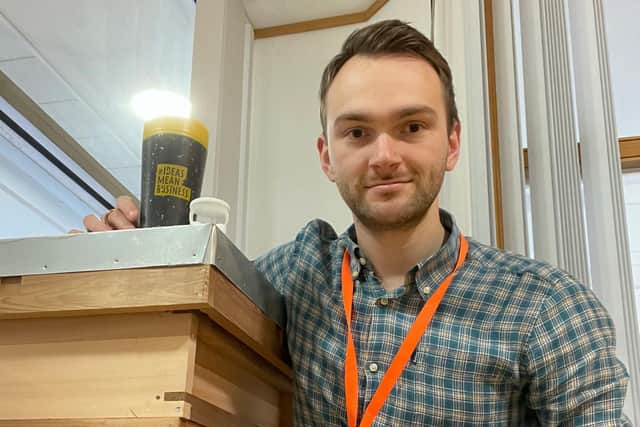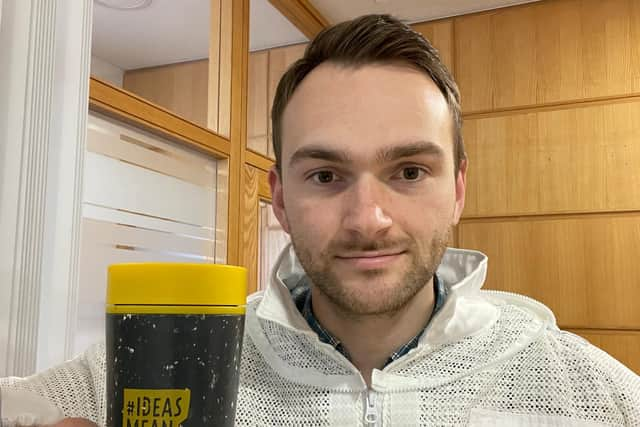How businesses can help boost biodiversity through little changes to their surroundings
Casey Woodward, founder of AgriSound, says the UK is one of the least biodiverse countries in Europe.
Speaking to The Yorkshire Post, he said: “There’s a lot that needs to be done to improve biodiversity here in the UK.
Advertisement
Hide AdAdvertisement
Hide Ad“Generally, I think the tide is turning. The discussions we have with the general public is that people really want to do their bit.


“Farmers are going above and beyond to try and improve biodiversity on their land. Corporates are now trying to plant more types of flowers on their land.
“Everyone is waking up to the fact that it is a problem. People are starting to take actions which will reverse that decline.”
York-based AgriSound, which has created listening devices that help monitor the population of bees and other pollinators, has won £75,000 in funding from Tesco and the World Wildlife Fund (WWF) to pilot its technology.
Advertisement
Hide AdAdvertisement
Hide AdIt received the funding as part of ‘Innovation Connections’, a new accelerator programme created in a collaboration between the international supermarket and the global environmental charity.


The programme pairs pioneering start-ups with Tesco suppliers to fast-track innovation in the supply chain.
Mr Woodward said: “What we’ll be doing is deploying our devices into several different environments. There will be a mixture of farms in Spain, which are used to produce lemons and oranges and then some orchards here in the UK, which are used to produce apples.
"These devices will be monitoring pollinator levels across these sites, which are quite significant in terms of land mass.”
Advertisement
Hide AdAdvertisement
Hide AdAgriSound’s product works in a similar way to an Amazon Alexa but rather than listening out for humans it listens out for wing beats.
“It uses a wing beat frequency and then it does some smart analysis to work out if that is something of interest,” Mr Woodward says. “If it is then we can use some artificial intelligence to confirm whether that is a bee or something else.”
The bee population has been on the decline and there could be a “colossal” impact unless action is taken to reverse this trend with so much food production dependent on pollinators.
Mr Woodward added: “No one is questioning the impact pollinators have on society.”
Advertisement
Hide AdAdvertisement
Hide AdBiodiversity is important for more than just food production.
“If we lose biodiversity, we really run the risk of not being able to function as a society because all of the raw materials we need, all of the stuff that we use, just wouldn’t be available,” Mr Woodward said.
Businesses can do their bit by making small changes such as finding space for plants to enable pollinators to thrive, the founder of AgriSound believes.
He said: “The easiest thing to do is to look and try to find any bits of free space - whether or not that is a little bit of space in the car park, or a little bit of an area that is covered by grass or a bit of rooftop space and just try to bring in some nature into that space.
Advertisement
Hide AdAdvertisement
Hide Ad“If you can put a few flower seeds there or create a few hanging baskets or take a bit of grass up and put some flowers down instead - all of these little things play a tremendous role in benefitting insects in the environment.
“One of the problems that we have is it’s really difficult for bees to get around particularly if they’ve got to fly across miles and miles.
“It’s about creating little reservoirs of food and habitat for them, which means they can have a little pitstop and rest and go from there.”
Funding is music to AgriSound's ears
Receiving the funding from Tesco and the WWF is a “massive confidence boost” and a “big success” for the business, says Casey Woodward.
Advertisement
Hide AdAdvertisement
Hide AdHe added: “The reason this is so significant for us is because it’s the biggest project we’ve had so far to date.
“Working with Tesco and WWF means that all of the learnings from this project, we can take and roll out across Tesco’s food supply chains and all of their partners involved.”
Mr Woodward is a scientist and has worked in the wider agricultural sector for a number of years.
He saw first-hand how technology was being used to improve animal welfare and that is what gave him the idea for setting up AgriSound.